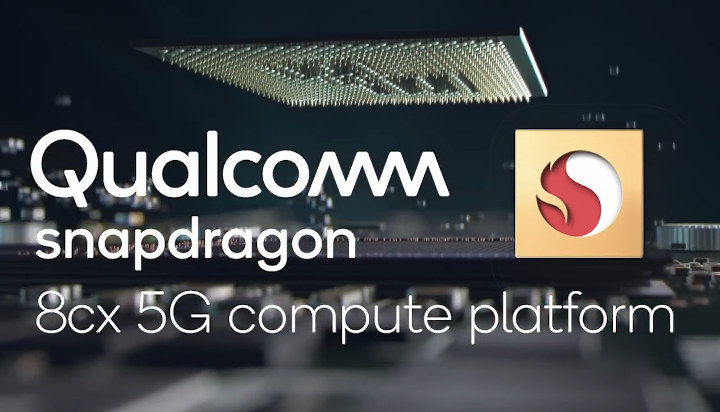Qualcomm announced Snapdragon 8cx processor for so-called always on, always connected mobile PCs in December 2018. The processor comes with eight Qualcomm Kryo 495 core, an Adreno 680 GPU with a 128-bit memory interface, NVME SSD, UFS 3.0 support, as well as a Snapdragon X24 4G LTE modem among other features.
But the launch 5G cellular connectivity will start to (slowly) take off this year, so the company also revealed plans for Snapdragon 8cx 5G compute platform that brings the same processing power as 8cx processor but with an extra Snapdragon X55 5G modem.
The company did not provide that many details about Snapdragon 8cx 5G in the press release, but we already know Snapdragon 8cx specifications as well as the key features of Snapdragon X55 2nd generation 5G modem, so we should already have a good idea about the platform. Qualcomm highlights the 7nm manufacturing process, multi-day battery life, and multi-gigabit 5G connectivity that will make remote storage as fast as local storage.
Qualcomm Snapdragon 8cx 5G compute platform is currently sampling to customers, and 5G laptop should start selling at the end of 2019. One of the first company on-board is Lenovo that announced it was working on a 5G PC based on the new compute platform at Mobile World Congress 2019. The company did not provide details about their 5G mobile PC, but considering the premium hardware and expected high price, Anandtech speculates it may be the first Arm based Lenovo Thinkpad laptop.
More details can be found in Snapdragon 8cx product page, as Qualcomm recently added information about 5G support.

Jean-Luc started CNX Software in 2010 as a part-time endeavor, before quitting his job as a software engineering manager, and starting to write daily news, and reviews full time later in 2011.
Support CNX Software! Donate via cryptocurrencies, become a Patron on Patreon, or purchase goods on Amazon or Aliexpress







” that will make remote storage as fast as local storage”
Yeah if operators don’t limit your 5G traffic or charge you an arm and a leg for it which is what they’re doing now.
And with the same latency as the good old spinning rust from the nineties in the best case…
The modem situation is unclear to me — is that interested vendors (like Lenovo) will get 5G/X55, or is that the platform is upgraded to X55 across the board, given how X24 is still listed on the specs page, along X55?
> The modem situation is unclear to me
What does it matter? Even if the European and American ISPs replace all their existing antennas with 5G by April 2020 and everyone has 5G smartphones by then, they won’t have enough fiber to deliver even 4G in the vast majority of locations.
Honestly I’d be shocked if I’ll get 240Mbit (80% 4G LTE) down by 2025. Currently I barely get a 1/5 of that on a particularly good day.
It’s not about what the customer will get under what conditions — I’m curious what QCOMM is trying to sell : )